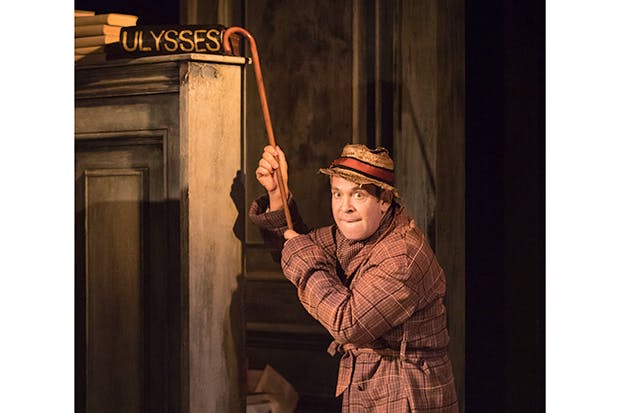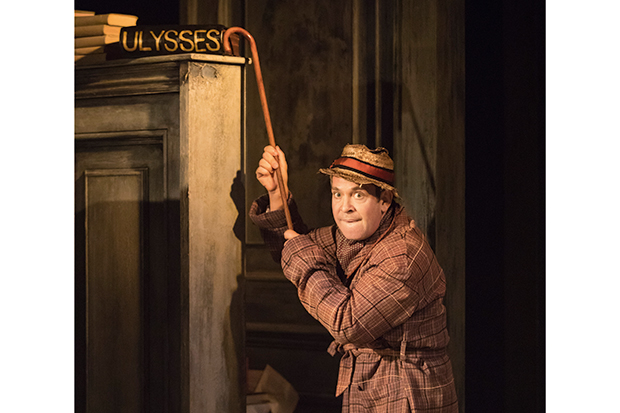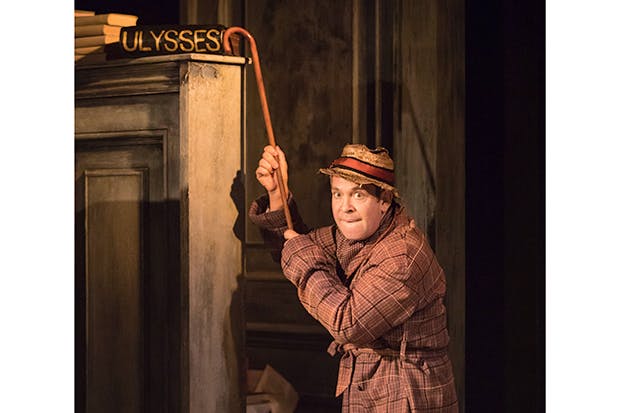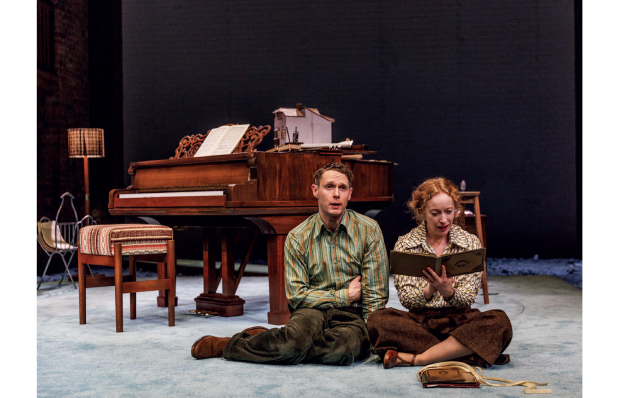Travesties is a multi-layered confection of art, song, literature and pastiche. Tiny snippets of it are true. In Zurich, in 1917, James Joyce directed a production of The Importance of Being Earnest featuring a British diplomat, Henry Carr, in the role of Algy. Joyce and Carr fell out over the costume budget and became embroiled in a brief legal wrangle. That’s the starting-point for Tom Stoppard’s dazzling intellectual pantomime which features cameos from Lenin and Tristan Tzara, both residents of Zurich at the time. Tzara was an experimental vandal whose penchant for slicing sonnets into pieces was taken up by copycats and flowered, or degenerated, into the Dada movement. Lenin, in 1917, was a penniless translator who within months would become the undisputed ruler of the world’s largest nation.
The plot is a little hard to follow but the fun lies in the play’s skilful arrangement of literary trifles and in Stoppard’s impish paradoxical humour. An erudite butler serves breakfast every morning while summarising the latest news from St Petersburg in the tweedy tones of a history professor. When Henry hears that the revolution is inspired by class he rejoices that Russia’s aristocrats have finally decided to sock it to the proles. Henry, besotted with fine tailoring, describes a shrapnel wound received on the Western Front in terms of the damage done to his hand-sewn seams rather than to his person.
But there’s more here than just playful effervescence. Tom Hollander turns Henry from a skittish buffoon into a figure of pathos and tragic grandeur. His speech lamenting the dead of the Great War is almost musical in its emotive power. And there are flashes of real anger in the rhetoric directed by Stoppard at Tzara and his self-important comrades on the avant garde. They’re accused of exploiting the label ‘art’ to extract a pension from society. The talent-free conceptualist is a mere skiver who ‘got a chit from matron’. Freddie Fox, a sign-language actor who gives every thought and sentiment a complementary hand gesture, is perfectly suited to play the preposterous show-off, Tzara. Peter McDonald gives Joyce the right sort of prickly self-assurance (but a bit of practice on the guitar wouldn’t go amiss). Sparky Clare Foster plays Gwendolen with marvellous comic naturalism. It’s great to see an actor harvesting big laughs without the slightest exertion.
Patrick Marber has directed an assured and well-paced (i.e. very fast) production. A word of warning. For all the praise it has garnered, this remains a challenging, crunchy play whose references will baffle anyone unfamiliar with Ulysses and The Importance of Being Earnest. An acquaintance with the biographies of Joyce, Lenin and Tzara will help. I assume that the plan is for a West End transfer to coincide with the rites of remembrance (or celebration, for those in the shadow cabinet) that will mark next year’s centenary of the Russian revolution. I trust the show will successfully vault the river. But I wouldn’t put it in a massive theatre.
Diehard Beckettians will travel anywhere in the world to grab a slice of Sam. The lukewarm votaries like me are less eager to pack their bags and rush to the airport. Even his keenest supporters must concede that his career showed little trace of artistic development. No’s Knife is a set of allusive, circular and often impenetrable ruminations collected by the performer, Lisa Dwan, from prose pieces written in the early 1950s. A single observation sums them up. Existence is an excruciating futility to be endured with honest suffering rather than rejected with vain self-slaughter. The voice of the speaker, though female, is hard to distinguish from the narrator of Malone Dies or The Unnamable. And we get no background detail to enlighten us about the mysterious on-stage chatterbox who seeks to delight us by reciting from her psaltery of despair.
The show’s main interest is visual. At first our gabbling hostess is revealed emerging from a jagged fissure of rock like a primordial barmaid in a clingy Top Shop dress. Next she wanders in a misty beachscape among slimy boulders that resemble ill-digested croutons disgorged by hungover giants. Her sea-green tights, now visible, are slashed at the shins to disclose suppurating crimson wounds. Finally, she’s suspended doll-like on a delicate wooden swing which might double as a bird-cage. This trio of milieux — rock, sand and air — are clearly laden with cryptic symbolism aimed at those Beckett fundamentalists who like to spend hours after curtain-fall swooning with pleasure over every component of the production. The rest of us, and that’s most of us, coughed during much of the show and emerged in a state of shocked relief. Mentally I felt I’d just escaped being smothered by a gang of maniacs. I glanced at my watch, certain that midnight had passed. It wasn’t yet 8.30.
Got something to add? Join the discussion and comment below.
Get 10 issues for just $10
Subscribe to The Spectator Australia today for the next 10 magazine issues, plus full online access, for just $10.














Comments
Don't miss out
Join the conversation with other Spectator Australia readers. Subscribe to leave a comment.
SUBSCRIBEAlready a subscriber? Log in